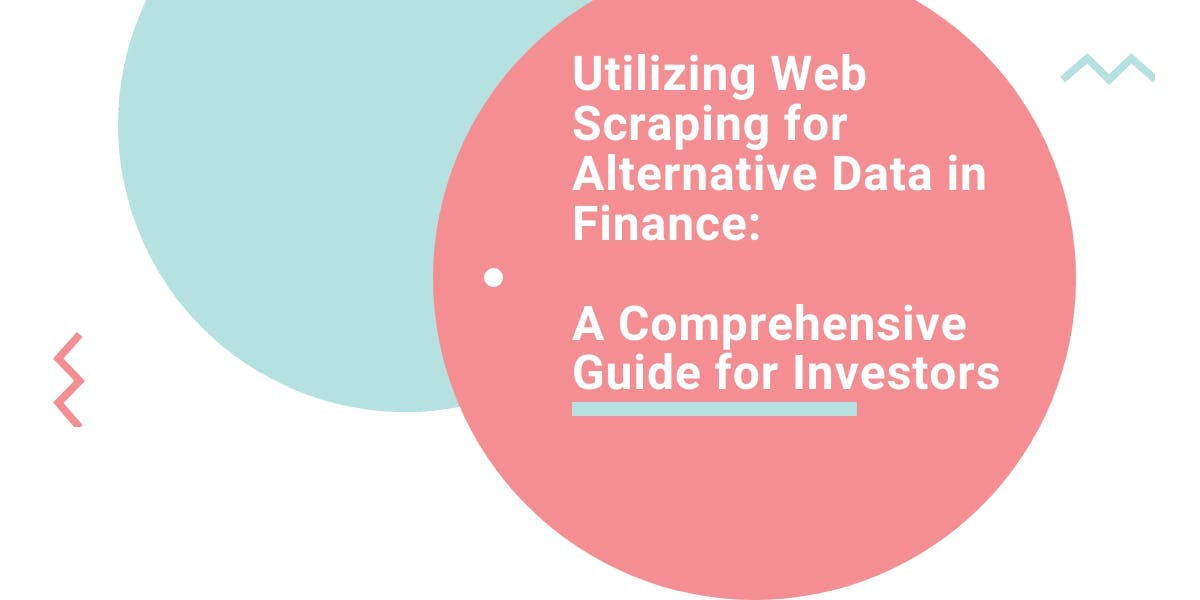How Web Scraping Can Help Your Startup Launch Successfully
Anda Miuțescu on May 24 2021

Getting a new business off the ground can be a difficult task. It goes without saying that you've done your research, ran a few scenarios, and worked tirelessly to provide a qualitative product just to discover that the marketplace wasn't receptive or that your target audience isn't present in the numbers required to make the project a success.
To be totally ready, you must know everything there is to know about your business, your audience, and your competitors. In order for that to happen, you must have a well-thought-out web scraping strategy.
Is Web Scraping the Key?
Web scraping is a technique for discovering and collecting information from websites using web bots. It's a modern strategy: let the robots do the grunt work while you concentrate on developing plans and analyzing results.
In an era where you need to be as knowledgeable and fast as possible if you want to have a shot in intensely competitive modern markets, the effects of data extraction prove to be an invaluable assistance.
Some may believe that investing time and resources in the website and database scraping is only worthwhile if you are well-established in the industry and want to collect more knowledge on rivals or experiment with new strategies. In reality, site scraping is similarly, if not more, beneficial to entrepreneurs, as the benefits of this approach could be critical to the growth of a new company.
Data provides concrete figures, allowing businesses to compare themselves to their competitors and remain ahead of the heap. By optimizing procedures and pinpointing where businesses can spend their time and resources, data will help companies save money and effort.
It's particularly relevant for selling to consumers because it allows you to learn about their tastes, lifestyles, and habits. When you gather more information, you'll be able to make the requisite adjustments to increase their conversion rates.
So you’ve got your idea, your precious startup gem. Here are the steps to make it work and get your round of applause:
Step 1: Study Your Market
Trends and trends abound, and new companies have no time to develop their identity and create adequate sales and media buzz. The scraped data (reports, empirical and statistical data, etc.) would help you get a general sense of how the business ecosystem is doing today, as well as the patterns that have become prominent as of late and which of them have quickly faded into nothingness.
You will stop making the same errors as the great majority of startups that failed, forecast how well yours will do, and potentially spot new opportunities.
Web scraping can also supply you with current knowledge of related goods and services on the market. Catalogs, online retailers, and the details of advertising strategies – all of this information can be obtained. All this information is golden when you’re devising a pricing strategy.
Without question, learning how much people charge for this or that good is impossible without a great amount of data. If you want to threaten your rivals' business share and attract clientele from them, you need to know who they are.
This brings us to our next point.
Step 2: Competition Who?
Scraping the most recent statistics on retailers' costs and goods isn't enough. That can only tell you where you are right now, so if you want to stay ahead of the competition, you should try watching them extremely loud and incredibly close.
Competition management is particularly common in eCommerce, but even if your startup isn't in that particular industry, it remains relevant nonetheless. Here, data extraction can help you understand how your competitor's pricing adjusts, in which parts of the market they are better or behind you, and so on.
This is not only an easy way to complete large volumes of market analysis but it can also be made an ongoing problem by merely making the scrapers run and write. That way, you'll be aware of any developments in your potential business, allowing you to make any choices you need in order to come full circle at the end of the day.
You may also use this tool to keep an eye on your competitors' product details to see if they have any new specs or features that you need to match. It'll help you realize just what your customer wants, the price points they're used to, and the functionality they can't live without as you head into the product creation stage of your startup.
Step 3: Be Social on the Media
Alternate universes do exist, just check out social media. Many individuals and organizations have established permanent residences on different social media sites. When it comes to industry, social media has had a massive effect on both customers and sellers.
It turns out to be a fantastic outlet for promoting the brand and generating sales through social media campaigns and marketing. The majority of businesses have begun to use scraped data for advertising around the World Wide Web.
The early industry adopters of social media data analysis were traditional businesses in the retail and finance sectors, which used social media analytics to leverage brand recognition, customer experience enhancement, content campaigns, and even fraud identification.
The biggest and most complex dataset on human activity is undeniably data scraped from social media. It provides social scientists and market analysts with unprecedented opportunities to better understand people, communities, and culture, as well as to explore the vast amounts of data available.
Step 4: Chin Up All Throughout
Attracting interest and buyers to your startup is critical, and it should be supplemented by an overview of what people think of your product after they've learned about it or tested it. The information gleaned from feedback and recommendations on individual blogs or social media can give you a sense of the public's general opinion.
Why not scrape blogs, feedback, posts, and comment boards for something your audience is saying about your product or related items as part of your latest product marketing campaign? If you would get a large data collection from the people you wish to engage with and dive deep into it for suggestions about what they actually want, it would be ideal for launching your startup into the world.
No Right or Wrong, Simply Web Scraping
Not too shabby for a startup with fresh ideas, are you now? We’re hopeful that this guide has helped you come to a startup-savvy understanding of web scraping and the hot-off-the-press ways it can bring a project to life.
Long live good business ideas. May they prosper with these 1000 free API calls from us.
News and updates
Stay up-to-date with the latest web scraping guides and news by subscribing to our newsletter.
We care about the protection of your data. Read our Privacy Policy.

Related articles

Explore the transformative power of web scraping in the finance sector. From product data to sentiment analysis, this guide offers insights into the various types of web data available for investment decisions.


Learn how to use Playwright for web scraping and automation with our comprehensive guide. From basic setup to advanced techniques, this guide covers it all.


What do you get when you take Ruby, a bunch of useful gems and a few hours? The answer - a pretty good web scraper. Here's a step-by-step guide:
